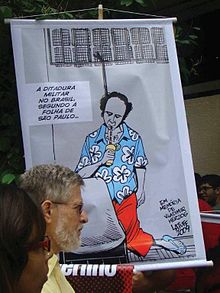- Dictablanda
-
"Dictablanda" is a word used by political scientists to describe a dictatorship in which civil liberties are allegedly preserved rather than destroyed. The word dictablanda is a portmanteau of the Spanish words dictadura ("dictatorship") and blanda ("soft"). There is an element of punning in the expression, involved in that blanda replaces dura, meaning "hard".
The term was first used in Spain in 1930 when Dámaso Berenguer replaced Miguel Primo de Rivera y Orbaneja as the head of the ruling military junta (or "directorio militar") and attempted to reduce tensions in the country by repealing some of the harsher measures that had been introduced by the latter. It was also used to refer to the latter years of Francisco Franco's regime, and to the hegemonic 70-year rule of the Institutional Revolutionary Party (PRI) in Mexico.
The term "dictablanda" can be usefully contrasted with "democradura", meaning an illiberal democracy — a system in which the government and its leaders are elected, but is nevertheless relatively deficient in civil liberties. One example was the result of the bloodless coup in Pakistan by Pervez Musharaf from October 12, 1999 to January 1, 2004, when Musharraf constitutionally became President of the country by winning 56% of the votes in its Electoral College[1]. Another was produced by the confirmation of Augusto Pinochet as President in the 1980 Chilean national plebiscite.
Controversial usage in Brazil
 Protest against Folha de S. Paulo's usage of the term at Grupo Folha headquarters. The banner, a reference to the famous photo of Vladimir Herzog hanged in prison after torture, says: "The military dictatorship in Brazil, according to Folha de S. Paulo".
Protest against Folha de S. Paulo's usage of the term at Grupo Folha headquarters. The banner, a reference to the famous photo of Vladimir Herzog hanged in prison after torture, says: "The military dictatorship in Brazil, according to Folha de S. Paulo".
On February 17, 2009, an editorial of the Brazilian newspaper Folha de S. Paulo criticizing the Hugo Chávez administration in Venezuela referred to the Brazilian military dictatorship as a "ditabranda" (Portuguese version of "dictablanda"). Since Folha de S. Paulo has the largest circulation in the country, reactions to the usage of the term were almost immediate.[2]
Among the first people to condemn the usage of the term were the newspaper's own readers and University of São Paulo professors Maria Victória Benevides and Fábio Konder Comparato. The newspaper answered that it "respects the opinion of readers that disagrees with the usage of the term in the editorial to refer to the Brazilian military regime". It, however, tried to debunk the letters sent by Benevides and Comparto, because they supposedly "have not until this day expressed their repudiation to left-wing dictatorships, such as the one still in power in Cuba". According to Folha de S. Paulo, their indignation was "cynical and deceitful".[3]
The newspaper was heavily criticized on the internet and by other media outlets, such as small left-wing magazines Fórum,[4] Caros Amigos (which published a cover story on the usage of the term),[5] and Carta Capital.[6] None of these critiques, however, had as much visibility as a news story titled "The ditabranda scandal" run by Rede Record on its Domingo Espetacular Sunday newsmagazine. It accused the Grupo Folha of maintaining liaisons with the dictatorship's repressive bodies. Folha de S. Paulo repelled itself from the accusations, which made Record run the story once again in its flagship newsprogram Jornal da Record and post it on its official YouTube channel.[7] According to the newspaper's own columnist Elio Gaspari, however, "cars of the company were borrowed to the DOI, which used them as coverage to transport prisoners".[8]
See also
- Democradura
- Liberal autocracy
References
- ^ Pakistan Gives Musharraf Confidence Vote as President, New York Times, January 2, 2004
- ^ (Portuguese) Editorial. "Limites a Chávez". Folha de S. Paulo. February 17, 2009. (Posted at NucleodeNoticias.com.br on February 27, 2009).
- ^ (Portuguese) FEIL, Cristóvão. "A Folha e a ditabranda". Vi O Mundo blog by Luiz Carlos Azenha, February 21, 2009.
- ^ (Portuguese) RAMOS, Camila Souza (interview with Beatriz Kushnir). "A “ditabranda” e os interesses comerciais da Folha". Revista Fórum. March 20, 2009.
- ^ (Portuguese) CINTRA, André. "De caso com a Ditabranda". Caros Amigos. April 2009.
- ^ (Portuguese) BENEVIDES, Maria Victoria de Mesquita. "'Ditabranda' para quem?". Carta Capital. February 27, 2009.
- ^ (Portuguese) "O escândalo da ditabranda" on Rede Record's official YouTube channel. Posted on April 7, 2009.
- ^ GASPARI, Elio. Ditadura Escancarada: As Ilusões Armadas, São Paulo: Companhia das Letras, 1st edition, 2002, p. 395.
Categories:- Forms of government
- Spanish words and phrases
Wikimedia Foundation. 2010.
